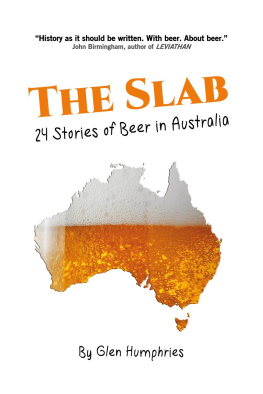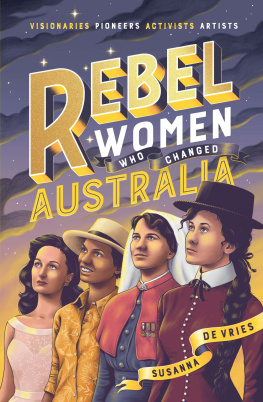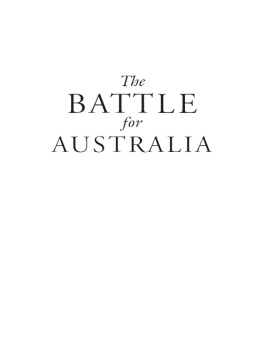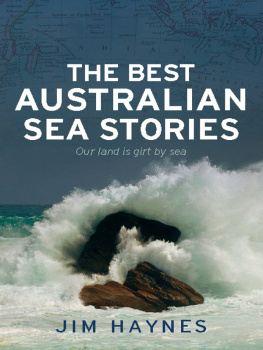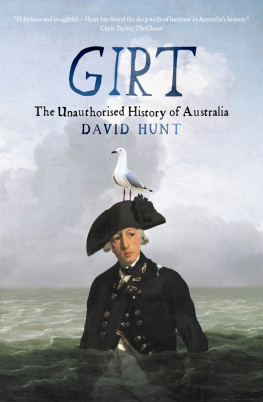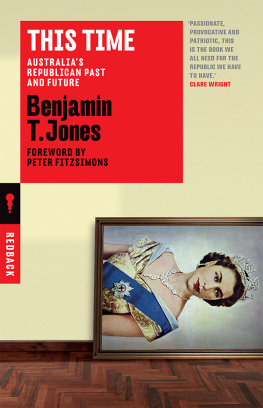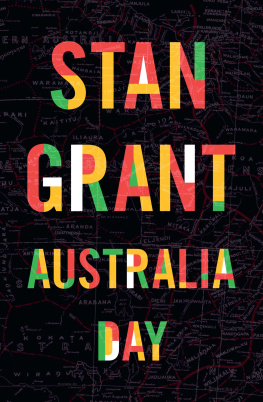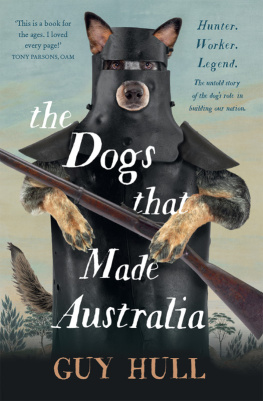Praise for Girt Nation
An entertaining and instructive historical romp through the formative period of Australian nation-making, with a colourful cast of rhymesters, revolutionaries, rebels, racists, reprobates and rabbits.
FRANK BONGIORNO, PROFESSOR OF HISTORY, THE AUSTRALIAN NATIONAL UNIVERSITY
Insightful, witty and beautifully written, Hunts latest offering is as Ozzie as a mozzie in a cozzie.
MIKEY ROBINS
I was hooked by the second sentence, and kept asking myself, How can this be so horrific, so hilarious, so ridiculous and, most shocking of all, so true? But this is not a mere history lesson: as Hunt deftly brings to life Australias past in a way that both illuminates and makes the reader cringe, he also makes us face our nations present, and future.
SUSAN CARLAND
An instant classic Hunts finest work to date. His clever use of language and insightful analogies connect Australias past with its present, showing how our history echoes today.
CHARLES FIRTH
Once again, David Hunt uses his sharpened wit to chisel away at misconceptions from Australian history, leaving us with the cold, hard truth of how our nation came to be.
OSHER GNSBERG
Praise for True Girt
An engaging, witty and utterly irreverent take on Australian history.
GRAEME SIMSION
Astounding, gruesome and frequently hilarious, True Girt is riveting from beginning to end.
NICK EARLS
[A] witty and irreverent romp along the highways and dirt tracks of Australian history.
THE WEEKEND AUSTRALIAN
Bitingly satiricial Erudition leavened with wit, this should be a definite addition to your bookshelf.
THE BIG ISSUE
[A] twisted take on Australian history Hilarious.
THE DAILY TELEGRAPH
Praise for Girt
A sneaky, sometimes shocking peek under the dirty rug of Australian history.
JOHN BIRMINGHAM
There is barely a page in Girt that wont inspire a chortle. Its our early history told by a writer with a wit sharp enough to slice tomatoes.
THE HERALD SUN
Girt cuts an irreverent swathe through the facts, fools, fantasies and frauds that made this country what it is today. I was transported.
SHANE MALONEY, THE AGE

How to enjoy the endnotes in this ebook
The words endnotes and enjoy are rarely found in the same sentence. Reading endnotes in most books is akin to being forced to listen to a thousand schoolchildren attempt to play Advance Australia Fair on their recorders.
However, the endnotes in this fine ebook are more like the Sydney Symphony Orchestra belting out AC/DCs greatest hits. They shouldnt work, but somehow they do. Some of the best bits of Girt Nation can be found in the endnotes.
The endnotes are meant to be appreciated with the text beside which they appear. Gently tap each endnote number as you encounter it and you will be transported to the relevant endnote text. After enjoying the endnote, tap the number and you will be returned to the bit you were up to in the main body of Girt Nation.
Dont worry, youll get the hang of it.
Published by Black Inc.,
an imprint of Schwartz Books Pty Ltd
Level 1, 221 Drummond Street
Carlton VIC 3053, Australia
www.blackincbooks.com
Copyright David Hunt 2021
David Hunt asserts his right to be known as the author of this work.
ALL RIGHTS RESERVED.
No part of this publication may be reproduced, stored in a retrieval system, or transmitted in any form by any means electronic, mechanical, photocopying, recording or otherwise without the prior consent of the publishers.
9781760640156 (paperback)
9781743822043 (ebook)
Book design by Peter Long
Typesetting by Tristan Main
Illustrations by Ad Long
Cover images: Alfred Deakin unknown photographer, National Library of Australia; magpie Shuang Li/Shutterstock; manhole Yashkin Ilya/Shutterstock; Parliament House Melbourne John Henry Harvey, State Library of Victoria
Photograph on : unknown photographer, studio portrait photograph of Thomas Hinton, 1900, National Museum of Australia
In memory of Frazer Allan
19662021
By David Hunt
The Unauthorised History of Australia
GIRT
TRUE GIRT
GIRT NATION
For children and the young at heart
THE NOSE PIXIES
MY REAL FRIEND
temper, democratic; bias, offensively Australian.
JOSEPH FURPHY, SUMMARY OF HIS NOVEL SUCH IS LIFE, 1897
In the land where sport is sacred, where the labrer is a god, You must pander to the people, make a hero of a clod!
HENRY LAWSON, A SONG OF SOUTHERN WRITERS, 1892
in another hundred years the average [Australian] will be: a tall, coarse, strong-jawed, greedy, pushing talented man, excelling in swimming and horsemanship his national policy a Democracy tempered by the rate of exchange. His wife will be a thin, narrow woman, very fond of dress and idleness, caring little for her children, but without sufficient brainpower to sin with zest.
MARCUS CLARKE, THE FUTURE AUSTRALIAN RACE, 1877
This book contains references to deceased First Nations people, all of which are in the public domain. Individuals and communities should be warned that they may read things in this book that could cause distress.
Introduction
a nation for a continent and a continent for a nation.
Edmund Toby Tosspot Barton, 1897
A USTRALIA.
How could one word mean so much, yet so little? It might one day be a nation, but who would be its people? Would its bounds encompass the lands of the penniless sand-dwellers to the west, or the atlas-makers afterthought on the wrong side of Bass Strait? Could the sturdy yeomen of the south, whod never felt the leg irons chafe, reconcile themselves with the northern slavers? And how might the citizens of its two great cities join as one when they couldnt even agree on a football code? These disparate peoples shared a continent, but could they share a future?
There were green and gold shoots of possibility. Yes, there were Tasmanians, South Australians, Victorians, Queenslanders, Western Australians and New South Welshmen and they all considered themselves British but they also called themselves and each other Australian. There were differences, but also shared values. They believed in democracy (for men), a fair go (for white men) and housework (for women of all colours). They were committed to a free press, trial by jury and, for the most part, freedom of religion. They trusted in commerce, progress and the queen. And most of all, they shared the bond of losing money betting on ridiculously dressed shortarses engaging in S&M with defenceless animals.
The Melbourne Cup was not so much the race that stopped the nation, as the race that started it. Visiting American writer Mark Twain called Melbourne Cup Day the Australasian National Day, with no single event in the world, even the Fourth of July in the United States, able to match its fervour:
[The] race ground is the Mecca of Australasia. On the great annual day of sacrifice business is suspended over a stretch of land and sea as wide as from New York to San Francisco, and deeper than from the northern lakes to the Gulf of Mexico; and every man and woman, of high degree or low, who can afford the expense, put away their other duties and come. They begin to swarm in by ship and rail a fortnight before the day, and they swarm thicker and thicker day after day They come a hundred thousand strong


